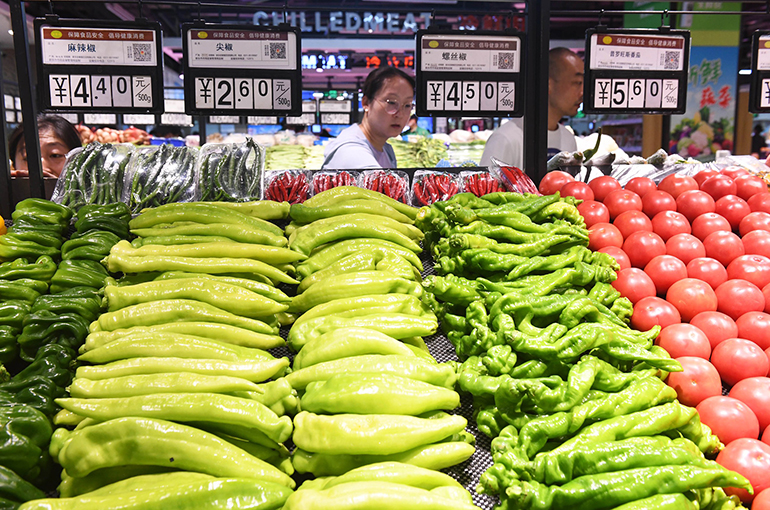 Consumer Inflation Returns to China in August
Consumer Inflation Returns to China in August(Yicai) Sept. 11 -- Consumer prices in China rose for the first time in three months in August, as government policies to boost consumption take effect, and the decline in producer prices slowed amid stronger demand for manufactured goods.
The consumer price index edged up 0.1 percent last month from a year earlier, data from the National Bureau of Statistics showed on Sept. 9. The CPI came in at minus 0.3 percent in July after flatlining in June. On a monthly basis, consumer prices gained 0.3 percent in August.
The core CPI, which excludes food and energy prices, climbed 0.8 percent, the same rate as in July and also the fastest pace since January.
The return of inflation was mainly due to smaller declines in pork and fuel prices and an uptick in service sector prices amid robust consumption during the summer travel season, said Wang Qing, chief macroeconomic analyst at Golden Credit Rating. But the weak overall recovery in consumption and lack of consumer confidence is keeping prices low, Wang added.
Over the summer, the transportation, tourism, accommodation, and food and beverage sectors boomed, resulting in big price markups that offset lower food and consumer goods prices, according to Pang Ming, chief economist and head of research at Jones Lang LaSalle Greater China.
Stable core CPI growth shows consumer demand is rising steadily, Pang said, but as the price increases for some consumer goods remains unstable, future policy measures need to focus on stoking demand, bolstering confidence, and preventing risks.
With the service sector and consumer spending continuing to recover this quarter and next, the core CPI is expected to climb to 1 percent this year, but the pace of recovery should not be overestimated, said Wu Chaoming, deputy director of the Chasing Research Institute.
Factory Gate Prices
The producer price index, a measure of industrial profits, fell 3 percent in August from a year ago, due to more robust demand for factory-made goods and higher international crude oil prices, the NBS data showed. That was an improvement on minus 4.4 percent in July and minus 5.4 percent in June. On a monthly basis, factory gate prices rose 0.2 percent in August.
The better PPI reading was due to an uptick in the prices of domestic raw materials and global commodities, as well as the low comparative base a year ago although the impact of the Russia-Ukraine conflict on prices last year had receded sharply, said Lu Ting, chief China economist at Japanese investment bank Nomura.
China rolled out policies last month to steady economic growth, boosting the price of commodities such as crude oil, steel and non-ferrous metals, Wang said. That, coupled with the ongoing decline in the year-earlier baseline, meant the drop in the PPI was much reduced, Wang said, indicating that it bottomed out in June.
The slide may lessen further in the next few months, given the effect of policies to spur demand and the low base last year, Wu said, adding that the PPI may stay negative this year on the back of falling real estate investment and lackluster private investment.
Editor: Kim Taylor